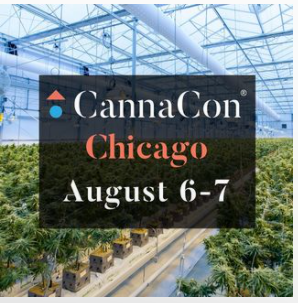
Click Here to see the whole video of us speaking at CannaCon Chicago!
This is a reoccurring topic of discussion, therefore this is a fluid post that we continually update. We have participated in multiple shows on the same panel discussion and want to ensure we provide the newest and most diverse points that are made.
“With the continuation of cannabis being legalized to the first degree many are continuing to enter the market at an accelerated rate. With The Canna Consortium’s combined experience of 100+ years, we have established a network and solid foundation to grow and be successful in the marijuana and hemp industry. This industry has incredibly high barriers to entry and we have succeeded in each of our own sectors to now have the experience of aiding you in battling yours. Our goal is to provide the information, connections, and support to the continuing cannabis industry. We aim to function with sustainable, efficient, and compliant practices, at home and beyond The Canna Consortium reach.”
In the following panel, we had founders Kim Stuck from Allay Consulting, Rocco Iannapollo from Cannabis Kitchen Supplies, John Roelke with Extract Consultants, and Liz Geisleman with 710Spirits®. Some panels include different members from the Consortium speaking as well. Each panelist started by addressing current issues and concerns they see in their prospective fields. Speaking on what to look out for as we are still feeling the repercussions of the 2020 pandemic throughout the supply chain. We then switched over to a Q&A session with the panelists.
The Canna Consortium always wants to make our speaking engagements worthwhile for the audience. Therefore we always allow time for the audience to ask any questions and ensure the information we discuss is pertinent to those listening. The answers are written are a combination of the responses from all panelists.
The Current State of The Cannabis Industry
Kim Stuck is the founder and CEO of Allay Consulting, a compliance strategy, and services provider serving the hemp, cannabis, and psychedelic industries nationwide. She brings a regulator’s keen eye and wide-reaching knowledge of evolving compliance and safety mandates to support businesses in tightly regulated industries.
Stuck: For my industry in particular before the pandemic, consultants usually were always on-site. However, in 2020 consulting had to make the move to completely virtual which proved to lower costs significantly and encourage companies to use consultants more. An issue however is that companies aren’t understanding completely how to implement SOPs properly when not shown in person.
Utilizing his deep business acumen, particularly around supply chain and vendor management, Rocco Iannapollo has become a versatile advocate for client needs. In addition to optimizing client supply chains (using Total Cost of Ownership principles), he is well-positioned to help companies implement sustainable business practices and develop business strategies to improve performance and enhance resiliency.
Iannapollo: As we are all aware the supply chain is severely disrupted. The cost of goods, stainless steel, for example, has drastically increased lead times. Many companies found pinch points in the manufacturing process they did not know about before. Proving that finding secondary sources that are trusted along with working with your suppliers is incredibly important. Not only for the availability of raw materials and products but having those relationships create a solid foundation for the future, whatever that may bring.
Liz Geisleman is a Stakeholder for the Testing Work Group of the Colorado Hemp Advancement & Management Plan (CHAMP) appointed by Governor Polis. Where she participated in roundtable discussions on standard-setting for hemp testing protocols which will lay the foundation to the formal report being drafted by Colorado State University. More recently, Liz was elected to the National Cannabis Industry Association Board of Directors where they focus on national policies such as Safe Banking, decimalization, and de-scheduling cannabis.
Geisleman- Personally, with a company that has 7 verticals including a cannabis brand, we are seeing that this industry, globally, is still in a pandemic. Raw materials are not readily available in of countries we usually rely on. For example, Citric acid is not expected to stabilize till 2022.
Packaging materials are in short supply as well! Having packaging that isn’t as custom as your company is used to, may help with lead times and readily availability. Not to mention having 2nd and 3rd levels of sourcing for packaging with freight skyrocketing in price and lead time can be incredibly advantageous.
Iannapollo- It’s also important to note that utilizing Just In Time inventory is no longer the best way to go for most companies. Try to order at least two or three days before supplies is needed. With the shortages of truck drivers, especially in our domestic supply chain, try to plan in advance to account for unknowns.
Stuck- We’re also seeing more regulation on a federal level. Please remember that OSHA has jurisdiction over all THC companies. OSHA is the highest fining jurisdiction in the USA and you need to ensure your business is continuing to be OSHA compliant.
Geisleman- Understand that operational costs should not always be one of your least costly bills. Always try to meet at a happy middle for compliance pricing. In the long run, there is better profitability and you ensure you are never caught off guard and stuck in a bad position.
Iannapollo- Some of the positive results of the pandemic were changed operational hours. In turn, reducing operating costs by 2/3rds in some cases. The pandemic caused businesses to look harder at ways to be more profitable with less; this did happen in several cases. Think of restaurant delivery models that were put together in a matter of days. This crossed over to the cannabis industry with dispensaries especially and many continuing to find efficiencies in business models.
Geisleman- Let’s change gears and discuss the new bill in the senate concerning the federal legalization of marijuana.
Stuck- I think it’s a great step forward. However, it is a double-edged sword. For one it gets rid of 280E and allows for normal banking processes, but adds a 25% federal tax. We need to not get too excited right off the bat. Dial back and re-look at the bill and how it will impact cannabis businesses. This is a legacy market and many make a living as legitimate businesses trying to normalize against the stigma of cannabis. This high federal tax could push many back to selling on the street and have long-term negative consequences for cannabis.
Geisleman- With a 25% excise tax something that could be made at home won’t encourage businesses to grow and succeed. The bill is vague and doesn’t address things such as potency, testing, methodology, etc. It’s concerning when we can’t pass SAFE banking but in one overarching bill are trying to federally legalize marijuana. If the government can’t pass one piece of the full legalization bundle how can they be expected to pass all it all in one fell swoop?
The FDA is in control of all public health safety concerns yet is still not addressing some of the already first steps of how to regulate this industry. For example, hemp is legal and the FDA still can’t figure out that market. This bill opens a huge opportunity for big pharma to come in and take over. While nobody asked the cannabis industry and experts in the field. There are no cannabis stakeholders involved in the bill and therefore we should be greatly concerned that the bill will not benefit those in the industry.
Southern Hemp Expo Panel: The Good, the Bad, and the Ugly of What Came Out of the Pandemic.
Supply Chain Issues
One of the most prominent issues we see currently feeling the ripples of the pandemic is the supply chain. Governments across the world are failing and shutting down. In turn, shutting down important processing product plants and putting the stability of the international supply chain at risk. Even on the national level, climate change is forcing us all to rethink how we get our raw materials, with Hurricane Ida recently hitting New Orleans on the anniversary of Katrina or the huge freeze in Texas at the beginning of 2021.
You have to know exactly where your products are coming from. Vetting your suppliers and understanding that there will always be significant lead times prepare your business for the unknowns. That being said it’s always better to have a disaster recovery plan. Do not wait for something bad to happen! Plan ahead and be ready for whatever the supply chain throws at you this quarter, year, etc.
Covid, climate change, and unstable governments are not going anywhere soon. It’s better to be prepared than to pray that it will end soon. Use your networks when you don’t know or are unsure about something in your supply chain. The shortage of labor in the hemp industry is unfortunate as many of those workers are not considered essential but having solid SOPs and proper training procedures will create a culture and environment where people will want to work and stay. Everyone in this industry wants to help prevents others from falling into the same pitfalls and mistakes others have made. If we succeed together we can improve this industry tenfold instead of tearing each other down.
Synthetic Cannabinoids
The issue of synthetic cannabinoids has also become the forefront of the hemp industry. While many states are getting creative with synthetic cannabinoids derived from hemp such as Delta 8 and THC-O if we don’t properly regulate the industry most of these synthetic products will most likely get banned, as we have already seen in multiple states. It is true the CBD market bottomed out and isomers helped to save the hemp industry. Innovation is great as long as it maintains good intentions and strives to be as safe as possible for consumers. Always test your products and double-check that any product is within FDA standards.
Make sure that whoever or wherever you are creating your products stays within OSHA guidelines. It is a GMP violation to change ingredients during a supply chains shortage WITHOUT changing your SOPs as well. If ever audited and the papers don’t match the actions/products you will be fined. Remember that the FDA has jurisdiction over the hemp industry, always always follow your local, state, and federal regulations.
Q&A
Q. If cannabis is nationally illegal, does the state, therefore, tax everything sold?
A. With the Cannabis Administration & Opportunity Act bill being introduced cannabis would be federally taxed on top of additional state tax, which adds up to a ridiculous amount. Therefore, many would simply ask why wouldn’t I grow myself. For example, CO already has long-established state taxes on cannabis. However, the new bill is intentionally vague and can be interpreted differently by many. Since it is so unclear there can be huge unintended consequences long term. Instead many think we should take federal legalization one bite at a time rather than in one bill.
Having regulations that are specific is incredibly important and helpful. A Food safety plan that has a one-page SOP leads to wording that’s off, vague, and leaves it up to the regulator. A lot of the bill is vague on purpose so they can figure it out later. HASSA is a great source of information as well for creating a food safety plan.
Q. What is the biggest hiccup you guys see with licensing?
A. Generally not having solid SOPs or training in place. Also, a huge factor is dependent on the state. For example, in Oklahoma, it seems as though anybody can get a license, all you need to fill out is an online form. However, New York is requiring a GMP certification required before you even apply. We notice more than the east coast is focused on health and safety before licensing is even considered. While the West Coast is not as strict seeing as they have more of a history and experience with giving out licenses.
Keep in mind that GMP certifications are not something you can get overnight. They can take up to 8 months or more at times. Always always always overachieve! Hiring someone to write your SOPs and other compliance material that have regulatory background is a huge pro. They know how to write the way regulators want to hear them so don’t try to figure out everything yourself. Make sure to build up a solid network. Excel at what you know you and you’re business is good at and then fill in gaps with experts. It can be costly in time and money if you attempt to figure it out yourself. The process never goes as fast as you want, so be patient and know there are resources and advocates out there to help you.
Safe-Gaurd Yourself
Use insurance companies that are pro-cannabis, many are giving discounts to encourage the market. Have a regulator up to speed on your operations and make sure to have a consultant come in every year to stay up to date with regulations as they change constantly.
Keep in mind that the FDA gives a warning letter while the FTC does not. The FDA doesn’t have teeth to fine like the FTC does therefore DO NOT PUT CLAIMS ON LABELS. Labels are a pain and need to be monitored stringently. The FDA and FTC scour websites and social media constantly to hand out warning letters or fines. Remember that warning letters can be fixed but lawyers keep an eye out for letters issued and then jump at the chance to file a class-action lawsuit. If you are concerned about the FDA and FTC read more here about labels, claims, FDA, and FTC.
Q. What do you think of Apple coming out with apps that are allowing cannabis information the use of cannabis, delivery, etc.
A. If you are curious or interested build your own app then you should do it! We aren’t seeing any clients using it right now but as with all social media make sure to have a 21+ validation. Mostly we are on LinkedIn because it is one of the only places to post about marijuana and any cannabis-related topics without getting banned. Make sure to check with a lawyer that you are adhering to all the current rules. Recently Apple updated its store guidelines so make sure to always understand the rules and how to stay compliant.
“LEGAL WEED IS OK, BUT IT’S GOTTA BE LEGAL
Weed apps have been touch-and-go on iPhone for many years, and not for lack of rules. This is more about letting developers know that a certain narrowly defined category is allowed.
(ix) Apps that provide services in highly-regulated fields (such as banking and financial services, healthcare, gambling, legal cannabis use, and air travel) or that require sensitive user information should be submitted by a legal entity that provides the services, and not by an individual developer. Apps that facilitate the legal sale of cannabis must be geo-restricted to the corresponding legal jurisdiction.“
The Verge
Q. What do social media sites look for when trying to shut down your accounts?
A. Really anything with cannabis. Or any claims about your product. If you claim or connect yourself to a claim that your product alters the chemical, mental or physical state of a customer. You risk getting fined or shut down by the FDA or FTC. We saw this during Covid especially. Many made claims that products prevent Covid, cure Covid, aid in the prevention of Covid, etc. These claims shut down countless companies during the pandemic. Keep in mind that other people commenting on your social media and reviews for your products mean you still own those claims. You own anything connected to your business which the FDA/FTC can then connect to your business and get you into hot water. AHPA is a good resource that addresses the subjects of what you can or cannot say with actual lawyers weighing in.
Q. Any financing tips for those starting their business or trying to grow?
A. It always depends on who’s giving you the money. Companies like 420 solutions are always looking for businesses to invest in and provide loans from investors. However, if you can own your own company do it! During the pandemic, we saw a ton of financial freezing and now with supply chain issues it’s still pretty tight so be aware of that.
Q. What are you seeing with social equity initiatives on the federal and state level?
A. It 100% depends on the state. New York is starting strong by creating a solid foundation as they begin its recreational legalization. When Colorado first legalized we started with 60% of every cannabis CEO being minority or woman, specifically in Denver. Now it is currently down to 8%. This happens because investors buy the companies. We need diversity! It is a cannabis culture. The NCIA makes policies nationally and has a comprehensive social equity plan to reference for those nationwide.
Q. What’s the difference between water-soluble vs. nanoemulsion CBD?
A. A small explanation of water-soluble and nanoemulsion CBD:
“Water-soluble CBD is created using a process called nanoemulsion. Nanoemulsion, or nano emulsification, involves the use of ultrasonic waves that shatter CBD molecules into dozens of tiny CBD “nanoparticles” that are a fraction of their original size.
Since CBD nanoparticles are so much smaller than regular CBD molecules, they can travel through mucous membranes in the mouth and esophagus–thresholds that the CBD molecules in oil are too large to pass through. By traveling through these cellular membranes, CBD nanoparticles take a shortcut into the bloodstream, bypassing the internal organs where the CBD molecules in oil go to waste. As a result, nearly all of the CBD in an initial dosage reaches the bloodstream to produce active effects.”
If you want to learn more about water-soluble vs. nano-emulsion check out this great article here!
Moreover, the biggest price seen in the marketplace is a huge price difference. Water-soluble is used more in the making of food products such as edibles. While nanoemulsion is seen more in cosmetics and health care, such as face creams.
Q. Pros and Cons of different types of extraction- CO2 vs. Solvents vs. Solvent less?
A. CO2 has limitations and is hard to scale. Fire regulators don’t like gases and become incredibly stringent on inspections and requirements for facilities. Ethanol is well known and can run continuously however there is a huge federal excise tax on alcohol since the time of prohibition. If you’re looking to avoid this tax check out 710Spirits for your ethanol needs. New press and solventless extraction are good for specialty brands that do small batches of products, however, it’s difficult to ramp up production as a business grows because of the small batch sizes.
Level Up Your Operations
” A perspective from industry experts of the Canna Consortium into improved operational profitability in this ever-changing regulatory and challenging supply chain climate. This conversation is designed to deliver you the hottest information and ask the questions you need to be answered so you and your company are not left out in the cold.”
As hemp and cannabis progress out of a pandemic, the supply chain ripples are still being felt in this industry. Some would argue more than others because of the regulatory differences per state lines and the lack of history we have in this industry dealing with the different supply chain hurdles. The cannabis industry is used to a need it now has its yesterday type of mentality in producing products. However the pandemic didn’t change anything in the supply chain, it more so illuminated that we already had a “failed” supply chain.






